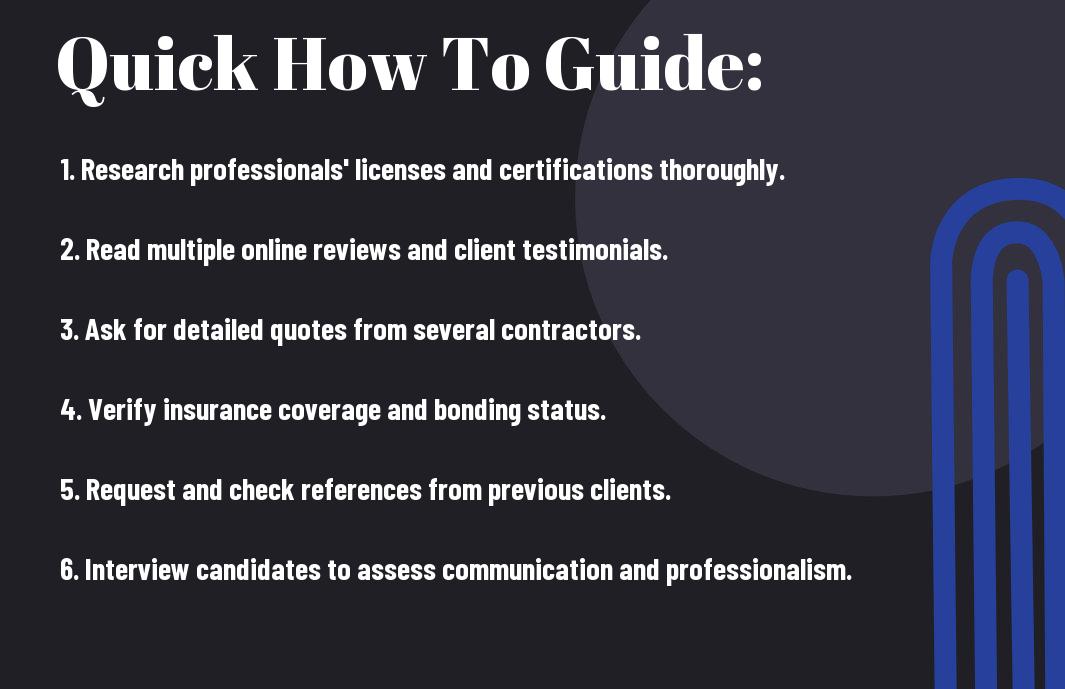Over the years, the importance of selecting trustworthy home improvement professionals has become increasingly clear. Whether you’re renovating a kitchen, updating your bathroom, or tackling any other project, choosing the right expert can make a significant difference in your experience and the quality of the work. In this guide, you will learn necessary steps to vet potential contractors, ensuring they meet your expectations and maintain high standards. With the right approach, you can find the perfect professionals who will turn your vision into reality.


Understanding Your Home Improvement Needs
The first step in any home improvement project is to clearly identify your needs and objectives. This means assessing what areas of your home require enhancement and determining your specific goals, whether it’s increasing space, improving energy efficiency, or enhancing aesthetics. By understanding your needs, you can effectively communicate your vision to professionals who can transform your ideas into reality.
Assessing Your Project Scope
An accurate assessment of your project scope sets the foundation for success. Start by outlining what you want to achieve and breaking it down into manageable tasks. This will help you identify the scale of the project, whether it’s a minor renovation or a major overhaul, allowing you to allocate resources and time effectively.
Identifying Necessary Skills and Expertise
Clearly defined project needs will help you identify the specific skills and expertise required for your home improvement task. Different projects may demand different specialists, such as electricians for wiring, plumbers for plumbing work, or carpenters for structural changes. Understanding the expertise necessary ensures you hire professionals who can tackle your project efficiently.
Skills needed for home improvement can vary widely depending on the nature of your project. For instance, if you’re planning a kitchen remodel, you’ll likely require professionals adept in plumbing, electrical work, and cabinetry, while a landscaping project might demand horticultural knowledge and design capabilities. Knowing these specific skills upfront not only aids in your search for qualified contractors but also enhances your ability to ask the right questions during the vetting process.
Researching Potential Professionals
Any effective vetting process begins with thorough research. Start by compiling a list of potential home improvement professionals, taking into account their specialties and previous work. Investigate their credentials, licensing, and insurance to ensure they meet industry standards. This foundational step sets the stage for making informed decisions as you narrow down your options.
Seeking Recommendations and Referrals
Seeking recommendations from friends, family, or neighbors can be an excellent way to find trustworthy professionals. Personal referrals often come with honest insights about the quality of work and reliability. Don’t hesitate to ask about their experiences and whether they would recommend the contractor or service provider, as firsthand accounts can guide you toward reputable choices.
Utilizing Online Reviews and Resources
Recommendations can be complemented by exploring online reviews and resources. Websites that aggregate customer feedback provide valuable insights into others’ experiences, helping you gauge the professional’s reliability and quality of work. Pay close attention to patterns in reviews—look for consistent praise or complaints, as they can significantly influence your decision-making.
Utilizing online reviews and resources offers a unique opportunity to assess the reputation of potential home improvement professionals. Seek platforms that provide verified reviews, such as Yelp or Angie’s List, to ensure you’re reading authentic feedback. Additionally, consider checking their social media pages or websites for project galleries and testimonials. This information will empower you to make decisions based on comprehensive knowledge rather than just word-of-mouth references.
Evaluating Qualifications and Credentials
Keep in mind that assessing a contractor’s qualifications and credentials is important for ensuring quality home improvements. Look for professionals who have the appropriate certifications, relevant experience, and a strong reputation in their field. Research their background, including years in service, any special training they may have completed, and their standing with professional organizations. This diligence will help you find someone who can meet your specific needs effectively.
Checking Licenses and Insurance
Even though you might be eager to start your home improvement project, it’s vital to verify that your chosen professionals hold the necessary licenses and insurance for their work. A valid license ensures that the contractor complies with local regulations and building codes, while adequate insurance protects you from liabilities in case of accidents or damages occurring during the project.
Reviewing Portfolios and Past Work
Past projects can reveal a lot about a contractor’s style and quality of work. Request to see portfolios showcasing their previous work to gauge if their design sensibilities align with your vision. Pay attention to the variety of projects they’ve completed, as this can indicate their ability to handle different types of jobs.
For instance, if a contractor has a diverse portfolio featuring a range of styles and materials, it demonstrates adaptability and creativity, which can be beneficial for your unique project. Look for testimonials or case studies that illustrate not just the final results but also highlights of the process. This will give you insight into how they communicate and resolve challenges as they arise, ensuring a smoother experience for you.
Conducting Interviews and Assessments
For effective vetting of home improvement professionals, conducting interviews and assessments is key. This step allows you to gain a deeper understanding of a contractor’s qualifications, work style, and reliability. Prepare to engage in thorough discussions that cover your project’s specifics while assessing their experience and approach. This foundational stage sets the tone for a successful collaboration.
Preparing Key Questions
Interviews should be guided by thoughtful questions that address your key concerns. Consider inquiring about their past projects, methodologies, timelines, and costs to get a comprehensive view. Formulating questions in advance ensures you cover all important aspects while providing a clear framework for the discussion.
Gauging Professionalism and Communication
Any good professional should demonstrate effective communication from your very first interaction. Pay attention to how they respond to your inquiries, as this reflects their professionalism and commitment to customer service.
Communication is vital in any project. You should look for clarity, promptness, and adaptability in their responses. A reliable contractor will not only answer your questions but also proactively offer insights and updates. Strong communication can greatly enhance your working relationship and reduce the likelihood of misunderstandings as the project progresses.
Comparing Estimates and Proposals
After gathering multiple estimates and proposals, it’s important to compare them systematically. Create a table to evaluate key aspects of each quote, helping you make an informed decision that aligns with your project needs.
Comparison Table
| Criteria | Description |
|---|---|
| Cost | Total expense and breakdown of materials and labor. |
| Timeline | Estimated start and completion dates. |
| Experience | Contractor’s past work and customer reviews. |
| Warranty | Coverage for materials and workmanship. |
Understanding Pricing Structures
While analyzing estimates, it’s vital to comprehend various pricing structures used by contractors. This understanding helps you pinpoint how labor, materials, and overhead contribute to the total cost, ensuring you’re not just comparing final figures but also the makeup of those numbers.
Evaluating Value Over Cost
Evaluating value over cost allows you to see beyond the price tag. While one contractor may offer a lower bid, assessing their qualifications, quality of work, and client satisfaction can lead you to a choice that ultimately provides better results.
Structures that provide exceptional value often include qualified labor, high-quality materials, and comprehensive warranties. By focusing on these factors rather than merely the lowest bid, you invest in a project that meets your expectations and lasts for years. A higher upfront cost can save you money in the long run by avoiding costly repairs or replacements.
Trusting Your Instincts
Unlike relying solely on credentials or references, trusting your instincts plays a significant role in selecting the right home improvement professional. Pay attention to how you feel during initial interactions; your gut feelings may indicate whether a contractor is genuinely interested in your project or simply looking to rush through the process. Prioritize your intuition, as it can help you gauge trustworthiness and professionalism before making a commitment.
Recognizing Red Flags
On your journey to finding a reliable contractor, be vigilant about potential warning signs. Red flags such as lack of proper licensing, questionable references, or evasive communication should alert you to proceed with caution. If a professional seems hesitant to provide details or pressures you to make decisions quickly, it’s wise to reconsider your options.
Establishing Comfort and Rapport
Clearly, establishing comfort and rapport with your chosen home improvement professional is vital. A strong relationship fosters open communication and enhances collaboration during the project, ultimately leading to more satisfying results. You should feel comfortable discussing your ideas, concerns, and any questions throughout the process.
It is necessary to have a good rapport with your contractor, as this sets the foundation for a successful working relationship. When you feel at ease, you are more likely to engage in honest discussions about your expectations and any potential challenges that may arise. Don’t hesitate to ask questions and voice your thoughts; a trustworthy professional will welcome your input and make an effort to understand your vision. Finding someone who communicates effectively and shares your values will make the entire home improvement experience more enjoyable and rewarding.
Conclusion
With these considerations, you can confidently vet and choose reliable home improvement professionals. Focus on checking credentials, reading reviews, and obtaining multiple estimates to ensure quality and value. Don’t hesitate to ask for references and communicate your project needs clearly. By taking these steps, you can select a contractor who aligns with your vision and delivers results that enhance your home. Trust your instincts and choose someone who prioritizes your satisfaction.



